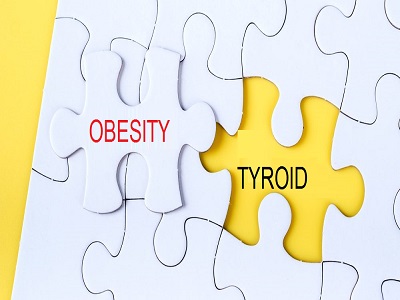Thyroid Management With Obesity
Obesity is one of the most important health risks of our time. The prevalence of obesity has increased worldwide since the mid 1970s. According to the National Health and Nutrition Examination Survey, obesity affected 32.2% of adults in 2003–2004 and reached a peak in subjects in the fifth decade of life. Obesity is associated with an increased risk of diabetes, dyslipidemia, kidney disease, cardiovascular disease, all-cause mortality, and cancer. Thus, severe obesity is an important cause of premature mortality among middle-aged adults. Moreover, obesity, especially central obesity, is linked to many endocrine abnormalities, including thyroid dysfunction. This is not surprising because T3 regulates energy metabolism and thermogenesis and plays a critical role in glucose and lipid metabolism, food intake, and the oxidation of fatty acids.

There is some debate about the link between obesity and the risk of autoimmune thyroid dysfunction (AITD), which is the main cause of hypothyroidism in adults. The prevalence of AITD in obesity has been reported to be 12.4% in children and between 10 and 60% in adults. This discrepancy may be due to such factors as sex, age, menopausal status, smoking habit, environmental factors, iodine intake, and degree of obesity.
In this issue of JCEM, Marzullo et al. address the intriguing hypothesis of a link between obesity, leptin, autoimmunity, and hypothyroidism. They estimated the prevalence and characteristics of thyroid autoimmunity in a population of obese men and premenopausal obese women and found that leptin increases susceptibility to AITD by regulating immune processes. As much as 69% of their patients had severe obesity (BMI > 40 kg/m2), and the prevalence of hypothyroidism was higher in obese patients than in a control group of age- and sex-matched subjects with normal BMI (P < 0.05), as documented by lower FT3 and FT4 plasma levels (P < 0.01) and a deranged lipid profile.
Obesity and thyroid dysfunction are common diseases, and consequently clinicians should be particularly alert to the possibility of thyroid dysfunction in obese patients. On the other hand, although thyroid hormones have been inappropriately and frequently used in attempts to induce weight loss in obese euthyroid subjects, there is no indication for their administration to control body weight except in obese hypothyroid subjects. In fact, long-term treatment with thyroid hormones does not significantly improve weight loss in obese subjects without thyroid dysfunction and, on the contrary, will entail a risk of adverse effects. It is conceivable that selected thyroid analogs might be a means by which to improve weight loss by increasing energy expenditure (as well as improving lipid profiles) in obese patients with low T3 during continued caloric deprivation.
